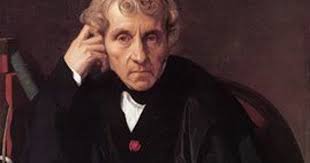Luigi Cherubini (1760–1842) was an Italian composer whose works were celebrated for their technical mastery, dramatic intensity, and contribution to the development of early Romantic music. Though he composed in a variety of genres, Cherubini is best known for his operas and sacred music. His ability to blend classical form with emotional depth influenced later composers, including Beethoven, who admired Cherubini greatly.
Early Life and Education
Born Maria Luigi Carlo Zenobio Salvatore Cherubini on September 14, 1760, in Florence, Italy, Cherubini came from a musical family. His father, Bartolomeo, was a harpsichordist and maestro al cembalo (conductor), and this early exposure to music played a crucial role in shaping Cherubini’s career. He began his formal music training at a young age, studying under Giuseppe Castrucci and later under the renowned opera composer Giuseppe Sarti, who was a significant influence on his compositional style.
By the time he was 16, Cherubini had already composed several operas, oratorios, and church music, demonstrating remarkable versatility and talent. His early success in Italy eventually led him to seek opportunities abroad, and in 1786, Cherubini moved to Paris, which became his adopted home and the center of his professional life.
Rise to Prominence in Opera
While in Paris, Cherubini initially composed operas for the Théâtre de Monsieur. His breakthrough came with the opera Lodoïska in 1791, which combined revolutionary ideals with classical operatic forms. The work was hailed for its vivid orchestration, dramatic intensity, and use of rescue opera themes—a genre popular during the French Revolution.
Cherubini’s Médée (1797) remains one of his most enduring works. Known for its psychological depth and complex character portrayals, the opera is considered a masterpiece of classical tragedy. Despite its challenging nature, Médée has been revived numerous times and is recognized as a key work bridging the Classical and Romantic periods.
Sacred Music and Later Career
After the political upheavals of the French Revolution and the rise of Napoleon Bonaparte, Cherubini shifted his focus to sacred music. His Requiem in C Minor (1816), written for the memorial service of King Louis XVI, is one of the most powerful and revered settings of the requiem mass. The solemnity, rich harmonies, and emotional depth of the work earned him widespread acclaim and solidified his reputation in sacred music.
In addition to composing, Cherubini took on administrative and teaching roles. He became the director of the Paris Conservatoire in 1822, where he mentored a new generation of musicians and composers. His influence extended beyond his own compositions; his emphasis on rigorous technical training helped shape the future of French music education.
Influence and Legacy
Although Cherubini’s fame declined somewhat after his death, his influence on other composers is undeniable. Ludwig van Beethoven considered Cherubini one of the greatest of his contemporaries, and the two shared a mutual respect. Hector Berlioz, Franz Schubert, and Felix Mendelssohn also admired Cherubini’s works, particularly his use of counterpoint and orchestration.
Cherubini’s operas, particularly Médée, are still performed today, and his sacred music remains an important part of the choral repertoire. He is often credited with laying the groundwork for the Romantic style in music, and his ability to combine classical forms with heightened emotional expression made him a pivotal figure in the transition between the Classical and Romantic periods.
Death and Commemoration
Luigi Cherubini died on March 15, 1842, in Paris. He was buried at the Père Lachaise Cemetery, and his tomb is adorned with a sculpture by François-Joseph Bosio. Though his name may not be as familiar as some of his contemporaries, Cherubini’s contributions to the world of music have left a lasting legacy. His works continue to be studied, performed, and appreciated by musicians and audiences around the world.
Conclusion
Cherubini’s life was marked by his ability to adapt to changing political and cultural landscapes, maintaining a balance between artistic integrity and the demands of his time. His mastery in both opera and sacred music earned him a place among the great composers of the late 18th and early 19th centuries, and his influence continues to resonate in the music of today.


Comments are closed